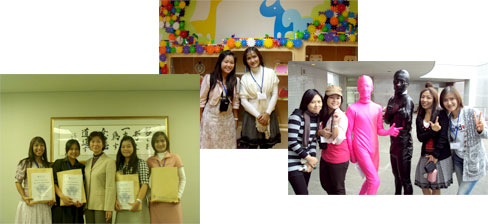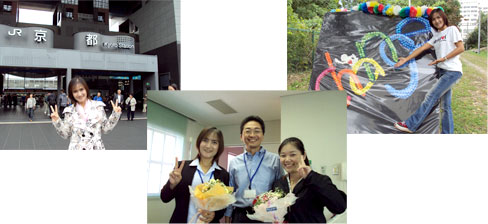Experiences, Benefits and Impression in The Students Exchange Program at School of Nursing, Osaka Prefecture University, Habikino city, Japan.
Syamol Rompipat
Master student of Nursing Science Program in Pediatric Nursing, Department of Nursing, Faculty of Medicine Ramathibodi Hospital Mahidol University
I had a chance to be an exchange student, and got many experiences and benefits from this program. e.g.
1. For Public Health and Nursing System
As I had a chance to visit many places; for example The Osaka Nursing Association, Welfare Center of Habikino City, The Association for Child Abuse and Neglect, Osaka Prefectural Hospital and Public Nursery in Habikino City , I learned about
- - Nursing system in Japan
- - Health insurance system and social welfare for mother and child including elderly people
- - Service and campaign against child abuse and neglect
- - Nursing service in Osaka Prefectural Hospital and environment around the hospital area
- - Management in a public nursery and practice for fostering children
I had many things to learned and practiced which are very importance experiences, because I could share new interested knowledge to my friends and faculty or apply for my workplace. But I feel disappointed because we could not be allowed into a pediatric ward because of the Swine flu problem. However, I understand the reason for disease protection.
2. For Nursing Education and Research
I learned about nursing education system in Japan that was similar to Thailand. I was looking around a laboratory room in OPU, where they had many contemporary medical appliances, various media for bestead nursing students. Moreover, I had a chance to discuss and share some knowledge and experiences with students and faculties through which I got good suggestions and encourage for conduct my thesis. The section in Oct 29 - Academic exchanges - was a beneficial section also because I could prepare myself for presentation in Oct 30.
3. For Different Cultural and Life Style
In my opinion, Most of Japanese people had good self-discipline. Japanese as well as Thai people are very polite and nice people because I saw many people in Japan smiling face and taking a bow many times when they said “Thank You” or “Sorry”. I tasted many Japanese food such as sushi, curry udon and takoyaki, which were less spicy than Thai food but very delicious and beautiful decoration dishes. Besides I went sightseeing many tourist attraction, for example Osaka Castle and Kinkakuji Temple, which were beautiful, old cultural and great historical sites.
Finally, I was impressed for warm welcoming from everyone - students and faculty members - who were supporting me all the time. I appreciated that so much. I would like to say “Thank You” again for everything that all of you did to me and my friends. I will never forget the real kindness you gave us.

▲ページの先頭へ
Benefits in The Students Exchange Program at School of Nursing, Osaka Prefecture University Habikino city, Japan
Chayannan Jaide
Master student of Nursing Science Program in Pediatric Nursing, Department of Nursing, Faculty of Medicine Ramathibodi Hospital Mahidol University
There are many benefits that I had learned and got from The Students Exchange Program.
1. Understanding Cultural Values.
Japanese Customs and Manners are individualistic culture. Many faculties and students in School of Nursing, Osaka Prefecture University (OPU) that I had met are very polite and have nice smiles. Japanese people usually walk so fast that’s why they are very healthy. Japanese language is very attractive. Furthermore I was impressed about people’s discipline which I saw everywhere, such as,
Students usually read their text books during a journey in train. They are very quiet and don’t talk noisy in public. Due to good country’s economic infrastructure, transportations are very modern and convenient - for example, buses and trains arrived according to a scheduled time every stations and I had not seen any traffic jam in Osaka city. The majority of people usually walk and ride bicycles.
The similar cultures between Japan and Thailand are customs and manners. Thais are also polite and kindly. Thais’ smile is one of our traditional beauties. Thai language is an individualistic culture and very attractive which I proudly presented. In my opinion, the difference which some Thais should improve are unpunctual behavior and loud speaking in public.
2. Good social infrastructure
In the exchange program, I had a chance to visit many places,such as,
- - Visited Welfare center of Habikino city for observation and Join the health program “Doukizuke Shien (motivation support) and Sekkyokuteki Shien (active support)” which focused on metabolic syndrome for insured elderly persons.
- - Visited Health center of Habikino city for observation The Mother and Child Health program.
- - Visited The Osaka Nursing Association. The chairwoman described about nursing politics, administration, and role of the Osaka Nursing Association. Then I went to observe and joined in the Learning program “To learn knowledge and skills under patient sudden change” at Momodani Learning Center.
- - Visited The Association for Child Abuse and Neglect for observation their activities – consulting for child abuse and neglect.
- - Visited for Observation the Parenting Program of Triple P in Patient Education Center.
Japan health insurance supports many options for their people from prenatal birth to elderly people including disabled persons which is similar to Thailand health insurance, but different in a few parts. Due to economic status and policies, Thailand has some limited options in the health insurance.
I had a chance to join and practiced in Habikino nursery which is related to my thesis area. I observed child care workers’ activities and discussed with a Habikino nursery team about their administration, problems, child health management and child health problems, which I had learned more and could apply for the benefit of my thesis.
The activities in Habikino nursery have to promote child development, child growth, and child health which are similar in Thailand, but compared to nursery or child care centers in Japan, they are less overcrowding than Thailand. Maybe because Japanese families usually have only 1 or 2 siblings.
I had a chance to visit Osaka Prefectural Hospital organization and Osaka Medical Center and Research Institute for Maternal and Child Health. How regretful I was!!. Since we had contacted with a Swine flu person (Japanese student), Pediatric area was very sensitive so they permitted us only looking around their units.
3. Academic exchanges with Japanese students of graduate School
I had a chance to talk, discuss, and share my experiences with many faculties and students – undergraduate and graduate students. I could progress my abilities of critical thinking, problem – solving, and traits of leadership. In addition to all these things, I got to learn new academic matters from different perspectives and thesis discussion class.
4. The friendship.
During two weeks visit in Osaka, Japan. I learned how to adapt or change my practices to different cultures and learned more about team working, perseverance, courage and sacrifice. Faculty staff and volunteer students are very friend and kind. They looked after us so well that I was impressed very much. I would like to say “Thank you for all of their kindness”. I still keep in touch with them because this is a nice friendship.
Finally, I would like to say thank you for all faculties, staff and graduate friends in my Department of Nursing which gave me an opportunity for being a representative to exchange at School of Nursing, OPU. I will surely try my best to pass on experience, which I acquired from this program to present for faculties, undergraduate and graduate nursing students. As per my wish, we can apply any suitable parts for the continuous improvement.

▲ページの先頭へ